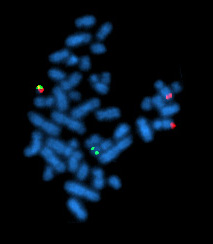| Philadelphia chromosome | |
|---|---|
 | |
| A metaphase cell positive for the bcr/abl rearrangement using FISH | |
| Specialty | Oncology |
The Philadelphia chromosome or Philadelphia translocation (Ph) is a specific genetic abnormality in chromosome 22 of leukemia cancer cells (particularly chronic myeloid leukemia (CML) cells). This chromosome is defective and unusually short because of reciprocal translocation, t(9;22)(q34;q11), of genetic material between chromosome 9 and chromosome 22, and contains a fusion gene called BCR-ABL1. This gene is the ABL1 gene of chromosome 9 juxtaposed onto the breakpoint cluster region BCR gene of chromosome 22, coding for a hybrid protein: a tyrosine kinase signaling protein that is "always on", causing the cell to divide uncontrollably by interrupting the stability of the genome and impairing various signaling pathways governing the cell cycle.[1]
The presence of this translocation is required for diagnosis of CML; in other words, all cases of CML are positive for BCR-ABL1.[2] (Some cases are confounded by either a cryptic translocation that is invisible on G-banded chromosome preparations, or a variant translocation involving another chromosome or chromosomes as well as the long arm of chromosomes 9 and 22. Other similar but truly Ph-negative conditions are considered CML-like myeloproliferative neoplasms.[3]) However, the presence of the Philadelphia (Ph) chromosome is not sufficiently specific to diagnose CML, since it is also found in acute lymphoblastic leukemia[4] (aka ALL, 25–30% of adult cases and 2–10% of pediatric cases) and occasionally in acute myelogenous leukemia (AML) as well as mixed-phenotype acute leukemia (MPAL).
- ^ Cite error: The named reference
Wapnerwas invoked but never defined (see the help page). - ^ "Chronic myeloid leukemia" (PDF). NCCN Clinical Practice Guidelines. National Cancer Comprehensive Network. 15 November 2021. Retrieved 2020-07-15.
- ^ "Myeloproliferative Neoplasms" (PDF). NCCN Clinical Practice Guidelines. National Cancer Comprehensive Network. 15 November 2021. Retrieved 2018-02-20.
- ^ Talpaz M, Shah NP, Kantarjian H, Donato N, Nicoll J, Paquette R, et al. (June 2006). "Dasatinib in imatinib-resistant Philadelphia chromosome-positive leukemias". The New England Journal of Medicine. 354 (24): 2531–2541. doi:10.1056/NEJMoa055229. PMID 16775234.